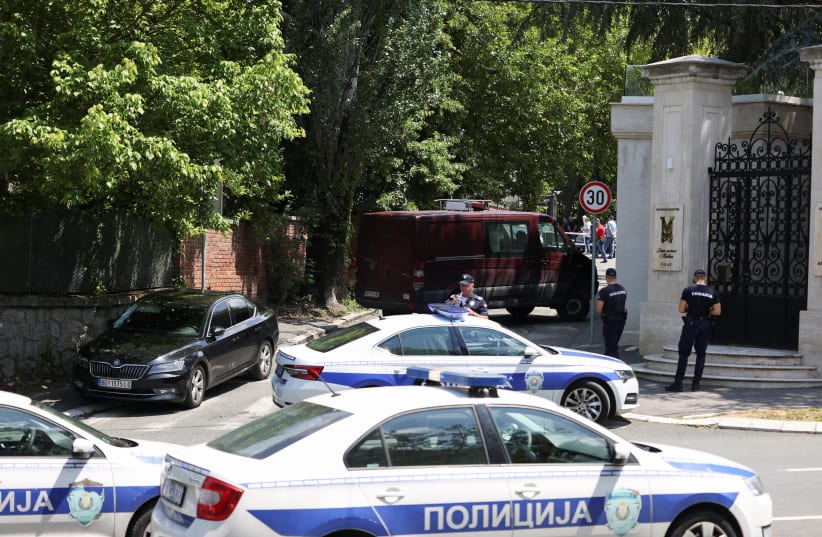ARTICLE AD BOX
Trust in police spiked to 59% of Jewish Israelis after the October 7, 2023, Hamas attack on Israel, during which Israel Police fought heroically to defend Israeli citizens.
By EVE YOUNG NOVEMBER 19, 2024 16:33 Police officers secure the area, after an attack near the Israeli embassy in Belgrade, Serbia, June 29, 2024.
(photo credit: REUTERS/ZORANA JEVTIC)
Police officers secure the area, after an attack near the Israeli embassy in Belgrade, Serbia, June 29, 2024.
(photo credit: REUTERS/ZORANA JEVTIC)
Trust in the Israeli Police is in decline, according to research by the Israel Democracy Institute, which was presented at the institute's Security and Democracy conference on Tuesday.
"Trust in the police has undergone major upheavals over the last year and a half," the institute said, adding that this trust was at a record low for the last decade during protests against the government's attempted judicial reform in June 2023. The rate of those who reported that they trusted Israel Police stood at 35% among Israeli Jews in this period, the IDI said.
Trust in police spiked to 59% of Jewish Israelis after the October 7, 2023, Hamas attack on Israel, during which Israel Police fought heroically to defend Israeli citizens.
Last year, there was a decline in this trust, with it falling to 39% of Jewish Israelis.
In Arab society, trust did not spike as high after October 7 but has also fallen more moderately and now stands at 25%, the IDI found, highlighting that this is "less than half what it was two decades ago."
There are also major differences between this trust among Jewish Israelis when looking at political affiliation. While 50% of those on the political Right trust the police, just 25% of those in the center and 15% of those on the Left trust the police, the IDI said - highlighting that these are historic lows.
Divided public trust in Israeli police
"The findings over the years show that even during the disengagement from Gaza, when the police were involved in dispersing volatile demonstrations associated with the Right, public trust in the police was not deeply affected by political orientation," said the report, saying that this shows that police were viewed as being above political disagreements.
"The question of the police's independence, neutrality, and professionalism has now become a political issue," the IDI added, saying that this shift began in 2018 based on previous findings.
The poll also found that around half of the coalition voters and a large majority of opposition party voters think that the actions of police command and officers in the field are impacted by politicians and are not based solely on professional considerations.
Answers were similar, albeit with a smaller gap between coalition and opposition voters, when respondents were asked if police officers' personal and political views impact their decision-making.
Stay updated with the latest news!
Subscribe to The Jerusalem Post Newsletter
"Interestingly, voters for Shas and United Torah Judaism are more similar in their views to opposition party voters, perhaps as a result of the experiences of Haredim as a minority group," said the IDI.
The institute also noted that "voters for Arab parties do not offer a more negative view of police officers in this regard than do Jewish respondents."
Asking whether Israelis think police "maintain the correct balance between the freedom to protest and public order considerations," the IDI found that "a small, yet sizable and stable proportion of the Israeli public, believe that the police do indeed act in a balanced way when policing demonstrations."
This means that among voters for all parties except three, between 33 and 47% of respondents agree that police strike the right balance.
This does not hold true for United Torah Judaism, Ra'am, and Labor voters. Among UTJ voters, just 27% thought this statement was true. For Ra'am voters, 23% agreed, and among Labor voters, 16% agreed.
"This discrepancy may stem from the fact that voters for these parties have been exposed (personally or via friends) to policing of demonstrations that have affected their responses," said the IDI.
The research was based on a survey conducted via the Internet and telephone in October of 2024. It included 600 men and women interviewed in Hebrew and 150 in Arabic. Respondents constitute a representative sample of Israel's population aged 18 and over, with a maximum sampling error of ±3.58% at a confidence level of 95%.

 2 months ago
122
2 months ago
122








 English (US) ·
English (US) ·